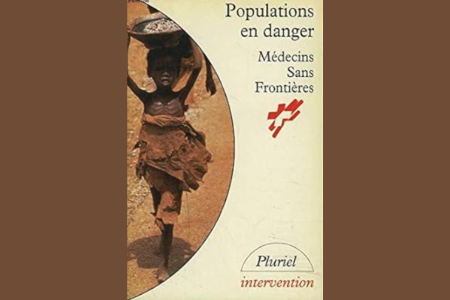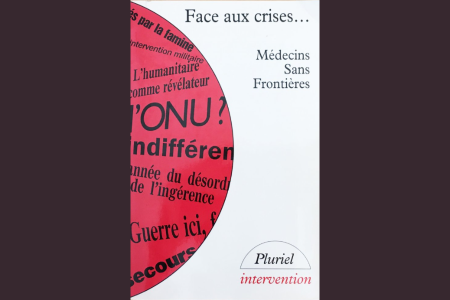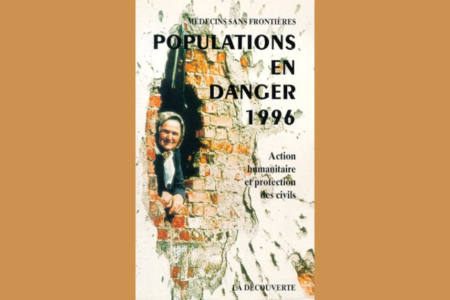
Populations in danger 1995
François Jean
Researcher at MSF-Crash, François Jean died on December 25th 1999. He wrote numerous books and articles, some published in Revue Esprit. He worked particularly on Afghanistan, Caucasus, North Korea and analyzed the evolution of humanitarianism without compromise.
We present here in their original edition the volumes of the "Populations in Danger" collection, launched by MSF in 1992, at the initiative of François Jean. These collective works, designed as an annual MSF report "on major crises and humanitarian action", presented MSF members, and all those interested in humanitarian action, with the reflections of MSF members and researchers on the contexts in which MSF operated and on the evolution of international responses to crises. This period in the early 1990s was one of great upheaval, in connection with the new interventionism of the United Nations and the deployment of armed forces in crisis areas. These books thus enabled operational managers to benefit from assistance in thinking about their work environment.
Original presentation :
« Never again »: in the wake of the second World War, the terror caused by the Holocaust led the community of states to condemn genocide as a crime and to create a new international organization, the United Nations. And yet, half a century later, the international community did nothing to prevent the first undeniable genocide since that of the Jews: it let the massacre of the Rwandan Tutsis and merely sent humanitarian aid, even though it was nearly over.
The Rwandan tragedy is at the heart of this new annual report from Médecins Sans Frontières, which aims at drawing attention on populations in distress and to stimulate the reflection on humanitarian action. Beyond the solidarity concern, humanitarian aid cannot be utilized as an alibi for politics’ cowardice or cynicism. This warning is precisely the one MSF intends to spread, through a concise analysis of the most serious crises that made the news headlines and a critical reflection on the ambiguities of humanitarian action.
For the first time, this annual report includes a “humanitarian atlas”, whose maps, realized by the Laboratoire d’études politiques et d’analyses cartographiques – LEPAC, illustrate the main challenges faced by humanitarian organizations.
You can download the EPUB and the PDF version of this book.
NB : If the EPUB download is not starting, please copy paste the link in a new tab or launch the download via Internet Explorer or Firefox.
To cite this content :
François Jean, Populations in danger 1995, 1 novembre 1995, URL : https://msf-crash.org/en/war-and-humanitarianism/populations-danger-1995
If you would like to comment on this article, you can find us on social media or contact us here:
Contribute MSF-Crash
Book
MSF-Crash
Book
Populations in danger
12/01/1992 François JeanIn the world today entire populations are at immediate risk of death from either famine, war, epidemics or displacement. The people of Southern Sudan, Somalia, the former Yugoslavia, Mozambique, Peru, Sri Lanka, Nagorno-Karabakh, as well as the Tuaregs, the Kurds and Burma's Moslems are those who face the most serious threats.
 MSF-Crash
Book
MSF-Crash
Book
Face aux crises
11/01/1993 François JeanIrak, Somalie, Bosnie, Cambodge, El Salvador... jamais la communauté internationale, sous l'égide des Nations unies, n'a été autant sollicitée pour intervenir sur les principaux terrains de crises. 75 000 casques bleus sont aujourdh'ui engagés dans des opérations de maintien de la paix.
 MSF-Crash
Book
MSF-Crash
Book
Populations en danger 1996: Action humanitaire et protection des civils
10/01/1996 François JeanGuerres, famines, épidémies, pauvreté... ces tragédies continuent à faire la une de nos journaux. Face à ces situations de crise, l'action des organisation humanitaires est de plus en plus complexe. La question de leur rôle, de l'absence de volonté politique des gouvernements, des responsabilités de la communauté internationale face aux crimes de guerre et aux violations des droits de l'homme, sont au centre des préoccupations contemporaines des acteurs humanitaires.
Période
Newsletter
Subscribe to our newsletter to stay informed about our latest publications. Interested in a specific author or thematic? Subscribe to our email alerts.
